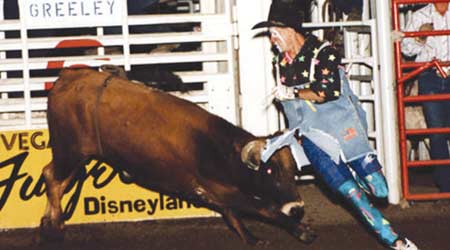
Ray Quinn has spent more than half his life in the rodeo. Known in that world as “Sugar Ray Quinn,” Ray is currently an announcer. But the outside sales representative for Carpenter Paper Company of Omaha, Nebraska, started his rodeo career as a rodeo clown.
Don’t let the “clown” part of the moniker distract you. It is a rodeo tradition that the bullfighter works in a clown costume, but it’s a dangerous job. A rodeo clown is trained as a bullfighter, and in the rodeo ring has the job of protecting a bull rider who was bucked off or jumped off.
“I was the guy who went in and made the saves and made sure the cowboys didn’t get hit,” says Ray. “I’ve had friends who have died doing their job.”
If you’re good at it, it’s a lucrative profession. With the income Ray made as a rodeo clown, he paid off his college student loans within a year.
Ray was a rodeo clown for 12 years (four years amateur, eight years professional), which is a long time. In the Professional Rodeo Cowboys Association, most bullfighters only make it four or five years because of the injuries that come with the job.
“I experienced broken fingers, broken ribs, and was always dealing with sore ankles because of uneven ground, or because a bull stepped on my feet,” says Ray. “It wasn’t until I broke my neck that I realized how vicious the sport really is.”
It was June 1993 — the year Ray finished 13th in the world rankings for rodeo bullfighters — that he was knocked out and broke his C3 vertebrae. He didn’t know he had a broken neck, and kept bullfighting. He found out six months later.
“In January, I was at the Montana rodeo circuit finals. Because the doctors and trainers were testing a new x-ray machine there, I found out I had fractured my neck,” he says. “The doc said I was a quarter of an inch from paralysis, but by the grace of God, everything healed naturally and straight. And I knew exactly when it happened. You always know when you took a good hit.”
Ray retired from bullfighting in 1998 when he was 31 years old. Using his broadcast journalism degree, Ray transitioned into being a rodeo announcer that same year, and now he does it on the weekends.
“I patterned myself after the best voices I heard, and asked myself, ‘What do fans want to hear?’ They want to hear something unique, something different, including tidbits of information,” says Ray. “I want the fans to feel like they know the rodeo competitors.”
Ray is also an announcer for collegiate sports in Omaha.
Good rodeo performers receive awards and perks. Ray has won 12 rodeo belt buckles, the traditional reward for rodeo accomplishments. He won his most prized buckle at the rodeo during which he learned he broke his neck.
“I still wear that one all the time,” says Ray.  Gretchen Roufs, a 25-year janitorial supply industry veteran, owns a marketing and public relations company in San Antonio. To suggest someone you think should be featured in “Freetime,” contact her at Gretchen@GretchenRoufs.com.
Gretchen Roufs, a 25-year janitorial supply industry veteran, owns a marketing and public relations company in San Antonio. To suggest someone you think should be featured in “Freetime,” contact her at Gretchen@GretchenRoufs.com.

 Celebrating BSCAI's 60th Anniversary eBook
Celebrating BSCAI's 60th Anniversary eBook The Down and Dirty on Cleaning in Virus Season
The Down and Dirty on Cleaning in Virus Season How Surfactant Use is Expanding in Commercial Cleaning
How Surfactant Use is Expanding in Commercial Cleaning